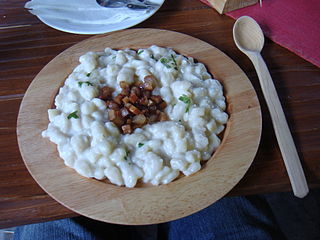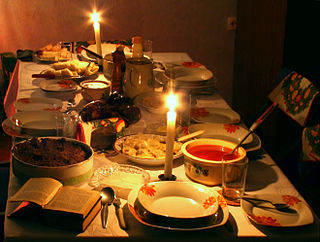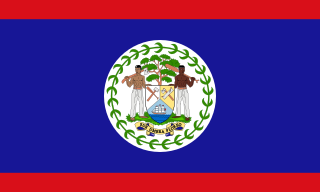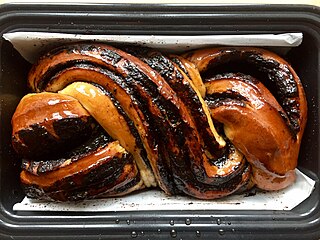Baba and similar words may refer to:

Hungarian or Magyar cuisine is the cuisine characteristic of the nation of Hungary, and its primary ethnic group, the Magyars. Hungarian cuisine has been described as being the spiciest cuisine in Europe This can largely be attributed to the use of their piquant native spice, Hungarian paprika, in many of their dishes. A mild version of the spice, Hungarian sweet paprika, is commonly used as an alternative. Traditional Hungarian dishes are primarily based on meats, seasonal vegetables, fruits, bread, and dairy products.

Polish cuisine is a style of food preparation originating in and widely popular in Poland. Due to Poland's history, Polish cuisine has evolved over the centuries to be very eclectic, and shares many similarities with other national cuisines. Polish cooking in other cultures is often referred to as à la polonaise.
Jamaican cuisine includes a mixture of cooking techniques, flavours and spices influenced by Amerindian, West African, Irish, English, French, Portuguese, Spanish, Indian, Chinese and Middle Eastern people who have inhabited the island. It is also influenced by the crops introduced into the island from tropical Southeast Asia, many of which are now grown locally. A wide variety of seafood, tropical fruits and meats are available.

Ukrainian cuisine is the collection of the various cooking traditions of the people of Ukraine, one of the largest and most populous European countries. It is heavily influenced by the rich dark soil (chornozem) from which its ingredients come, and often involves many components. Traditional Ukrainian dishes often experience a complex heating process – "at first they are fried or boiled, and then stewed or baked. This is the most distinctive feature of Ukrainian cuisine".

Slovak cuisine varies slightly from region to region across Slovakia. It was influenced by the traditional cuisine of its neighbours and it influenced them as well. The origins of traditional Slovak cuisine can be traced to times when the majority of the population lived self-sufficiently in villages, with very limited food imports and exports and with no modern means of food preservation or processing.

Wigilia is the traditional Christmas Eve vigil supper in Poland, held on December 24. The term is often applied to the whole of Christmas Eve, extending further to Pasterka—midnight Mass, held in Roman Catholic churches all over Poland and in Polish communities worldwide at or before midnight. The custom is sometimes referred to as "wieczerza" or "wieczerza wigilijna", in Old Polish meaning evening repast, linked to the late church service, Vespers from the Latin.
Norwegian cuisine in its traditional form is based largely on the raw materials readily available in Norway and its mountains, wilderness, and coast. It differs in many respects from continental cuisine through the stronger focus on game and fish. Many of the traditional dishes are the result of using conserved materials, necessary because of the long winters.

Czech cuisine has both influenced and been influenced by the cuisines of surrounding countries and nations. Many of the cakes and pastries that are popular in Central Europe originated within the Czech lands. Contemporary Czech cuisine is more meat-based than in previous periods; the current abundance of farmable meat has enriched its presence in regional cuisine. Traditionally, meat has been reserved for once-weekly consumption, typically on weekends.

Colombian cuisine is a culinary tradition of the six main regions within Colombia. Colombian cuisine varies regionally and is influenced by Indigenous Colombian, Spanish, and African cuisines, with slight Arab influence in some regions.
Potato cake is a name given to various shaped potato dishes around the world, including a patty of hashed potatoes, a fried patty of mashed potato, a fried and battered slice of potato, or a flatbread made with mashed potato and flour. In Northern England and some states in Australia, a thin slice of potato that is battered and deep fried may be called a potato scallop. In Australia and New Zealand, the terms potato cake, potato flip and potato fritter may be used.

Belizean cuisine is an amalgamation of all ethnicities in the nation of Belize and their respectively wide variety of foods. Breakfast often consists of sides of bread, flour tortillas, or fry jacks that are often homemade and eaten with various cheeses. All are often accompanied with refried beans, cheeses, and various forms of eggs, etc. Inclusive is also cereal along with milk, coffee, or tea.

A great variety of cassava-based dishes are consumed in the regions where cassava is cultivated, and the ingredient is included many national or ethnic specialities.

Palembangese cuisine is the cuisine of the Palembangese people of the city of Palembang in the South Sumatra province of Indonesia. It is the second most well-known cuisine from Sumatra after Padang.

A babka is a sweet braided bread which originated in the Jewish communities of Poland and Ukraine. It is popular in Israel and in the Jewish diaspora. It is prepared with a yeast-leavened dough that is rolled out and spread with a filling such as chocolate, cinnamon, fruit, or cheese, then rolled up and braided before baking.










